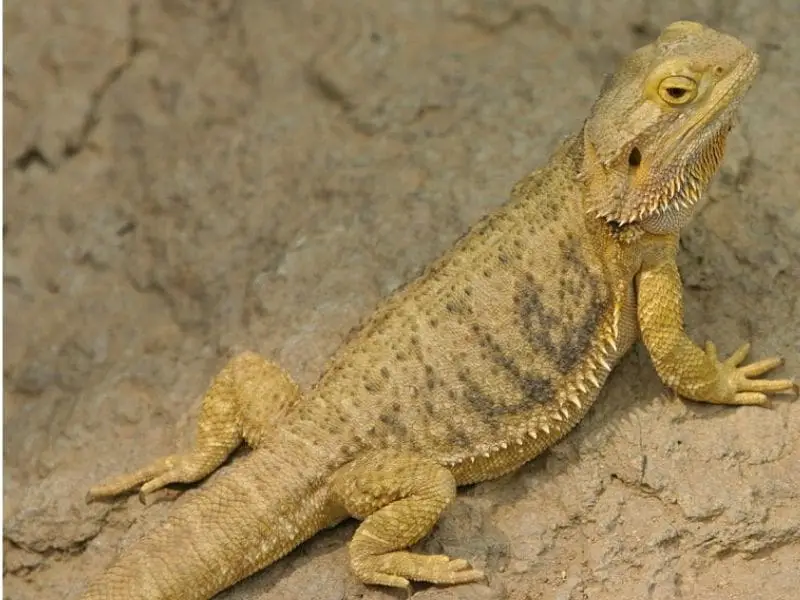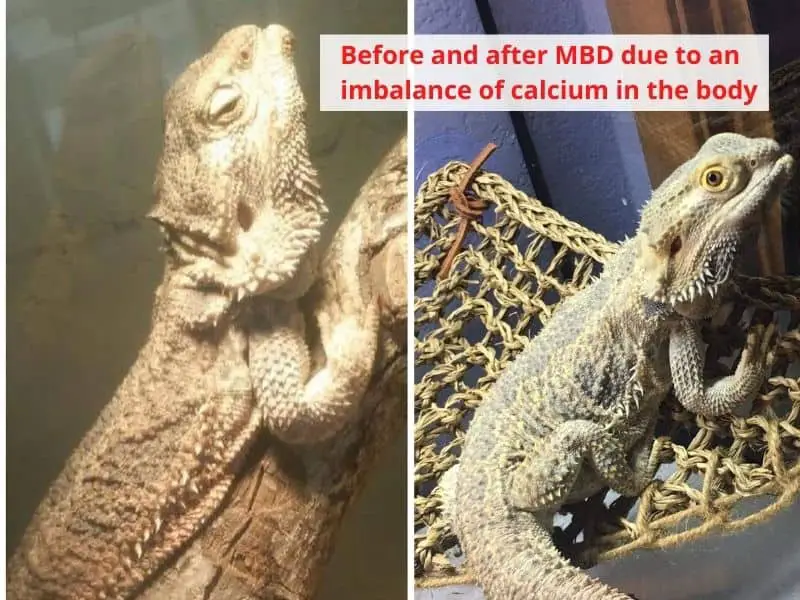Bearded dragons require high quality food and calcium supplementation in order to live well and be healthy. It is important to provide them with enough calcium for strong bone development. This article will help you understand how much calcium bearded dragons need per day and week.
Every bearded dragon needs calcium in order to build healthy bones and maintain a strong metabolism. The amount of calcium that bearded dragons need depends on the age and size: hatchlings require about 650mg per day, juveniles require around 1100mg per day, subadults require 1300mg per day, adults require 1500 mg per day.
What are the benefits of calcium for bearded dragons?

Although bearded dragons are omnivores, calcium is an important nutrient for them. They require it to ensure healthy bone development and growth.
Apart from aiding in bone development, calcium also helps bearded dragons in other ways. For instance, it can aid in blood clotting and proper nerve transmission.
In addition to bone development, calcium is also important for muscle contraction. A beardie that suffers from calcium deficiency may start to show signs of muscle twitching and lethargy.
The nutrient is also key in the synthesis of serotonin that regulates sleep patterns and mood swings among many other things.
Your reptile needs calcium for stronger jaws and teeth, as well.
Be sure to provide your reptile with this nutrient by dusting its food with an insect-based powdered supplement that includes calcium such as Repashy Super Dust.
More on the sources of calcium later below.
Signs of calcium deficiency in bearded dragons

The signs of calcium deficiency in bearded dragons are difficult to spot. However, your reptile’s general health will be affected noticeably. Note that proper diagnosis is key in determining the actual cause of the symptoms your beardie is showing, so consult a reptile veterinarian near you.
Here are the signs of calcium deficiency in bearded dragons:
Swollen Legs
Check your bearded dragon for any signs of swelling – particularly on and around the legs and hip area.
As the lizard’s body absorbs less and less calcium, its bones release excess minerals such as phosphorus. This causes soft tissue swelling which will cause your pet to have an abnormal gait when walking or moving around on their feet because they are carrying extra weight with them all day long.
Lethargy or inactivity
Lizards are naturally active creatures. When they stop moving around as much, it could be an indication of calcium deficiency because their bodies have to conserve energy and resources when there is not enough calcium in the system.
The bearded dragon will also show some sort of behavioral change – a lethargic demeanor or abnormal activity level could mean the beardie is suffering some kind of pain when moving. This discomfort is probably a sign of weak bones.
Abnormal bone growth
There is a possibility that the bearded dragon’s bones are not able to grow properly when they don’t have enough calcium in their system. This usually leads to stunted growth or even skeletal deformities such as bowed legs and spine curvature (scoliosis).
The lack of proper bone growth will also result in an abnormal gait because normal bone development is linked to the process of muscle tissue growth.
In addition, it’s possible that a bearded dragon with calcium deficiency will have difficulty biting due to inadequate jaw strength and poor wound healing.
Muscle twitching
If you notice twitching in your bearded dragon’s muscles, it could be a sign of low calcium levels. This is because the body will start to break down muscle tissue for energy when there isn’t enough calcium available to function properly.
As soon as you see twitching, try increasing your bearded dragon’s intake of vitamin D and calcium supplements so that they can function properly.
Color of droppings
Another way to tell if your bearded dragon has calcium deficiency is to look at their droppings. Droppings of bearded dragons that have a calcium deficiency will be greener in color than usual.
Dropping’s color is caused by the bile being released into it when they are digested, and this usually occurs because your bearded dragon has not been eating enough vegetables or other greens to properly digest them.
The normal color of a healthy bearded dragon’s stool is brown with yellow or white urate markings because it is made from digested food. The stool should also be firm in consistency and log-shaped.
The droppings of bearded dragons that have calcium deficiency are greener in color than usual. Therefore, observing the color of the droppings can tell if the beardie needs calcium supplementation.
The symptoms of calcium deficiency in bearded dragons can be mild to severe, but the most common symptoms are twitching, poor gait, and swollen legs. These occur because bone development is linked to the process of muscle tissue growth.
Keep an eye on your reptile to make sure you can spot these signs and symptoms early enough to start mitigating the D3 and calcium deficiency.
How much calcium do bearded dragons need
Baby bearded dragons need to consume about 30% of their body weight in calcium per day to grow normally. They can achieve this by eating the correct amount of vegetables, insects and other food types such as tomato fruit have great benefits for bearded dragons, so you might still want to include a little bit of this fruit in the diet of your beardie
Bearded dragons who are missing one or more teeth will need a higher intake because they cannot chew up all their food as well without those teeth. This leaves some undigested vegetable matter which does not contain any nutrition for the pets.
If you want your pet bearded dragons’ bones to be strong so they don’t break easily them make sure they get enough calcium from different sources – such as fruits and veggies (not spinach) or supplementing with liquid vitamin D+DHA.
Adult beardies need to consume about 600-1000mg of calcium per day, while babies need around 400-700mg.
How often to give bearded dragons calcium
The frequency of supplementing your bearded dragon’s calcium depends on factors such as age of the dragons (adult, juvenile, or baby), reproductive stage, and sometimes, gender.
It is recommended that you lightly sprinkle the bearded dragon’s food with calcium dust 2-3 times per week. Increase the frequency for baby and juvenile lizards. Use a calcium supplement that contains vitamin D3 to increase the absorption rate of the mineral and reduce constipation.
Here’s a table-summary of how often to feed your beardie with calcium:
| Age/Stage | Frequency |
| Lizards basking in the sun daily | 1–2 times every 2 weeks |
| Hatchlings | Daily |
| Adults | 2-3 times per week |
| Reproductively active lizards | 3-4 times per week |
| Juvenile lizards | 3-4 times per week |
Adult beardies don’t need a lot of calcium because they are not growing any more. For young lizards, make sure you feed them calcium on a daily basis to improve the strength of their bones and teeth.
The calcium needs of bearded dragons are met through their diet. Bearded dragon food is typically very high in calcium, so the only time to give them supplemental calcium would be when they healing from broken bones or other injuries.
Otherwise, it’s not necessary and may cause gastrointestinal issues for your pet if you don’t know how much to feed them. Too much calcium can also lead to constipation because there won’t be enough fiber in the diet, which will hinder digestion and stool movement through the colon.
Vitamin D3 and Calcium Absorption
Dusting bearded dragon food with calcium is not enough as they may not be able to absorb the nutrient effectively.
Vitamin D is important for bearded dragons because they do not produce it by themselves. Vitamin D helps with calcium absorption and bone growth, as well as other vital functions in the body such as immune function.
The best way to provide them with this necessary vitamin is through supplements that are specifically made for reptiles like Repti-Calcium Plus™.
Another way to ensure your bearded dragon gets enough vitamin D, try to provide an outdoor enclosure with UVB lighting.
Sources of calcium for bearded dragons
There are many sources of calcium for bearded dragons. The best way to make sure your reptile is healthy with strong bones is to feed them a diet rich in both leafy greens and protein from animal sources such as worms.
Here are the best sources of calcium for bearded dragons:
Gut-loaded insects
Gut-loaded bugs are a good source of calcium for bearded dragons as they are loaded with the nutrients your reptile needs to stay healthy. Gut loading is when you feed your insects high quality food before feeding them to your lizards to improve their nutrition.
Commonly gut-loaded insects include:
- mealworms
- crickets
- wax worms
- grasshoppers
To gut-load the insects and prepare them for bearded dragons, you can either feed them a high-quality calcium powder about 24 hours before feeding them to the reptiles.
This method works well if you’re feeding your bearded dragon live food. If you’re using dead food sources, you might want to opt for the dusting method.
If you’re going with a liquid supplement approach to gut loading, then dip each insect in the container before feeding it to your bearded dragon.
Calcium dusting
To dust your insects with calcium, you can use a powder calcium supplement. Mix the dust completely into the food to avoid any choking hazards. Be careful not to dust heavily and end up overdosing your reptile pet.
Be sure to wash off any leftover supplements after each feeding so that they don’t contaminate other food items.
Leafy greens
Another great source of calcium is leafy greens such as spring greens, collard greens, kale, watercress, lamb’s lettuce, mustard greens, carrot tops, Timothy Hay, and chicory. The best selection of greens are those that are low in oxalates but contain a high ratio of calcium to phosphorus.
You can easily add these to your bearded dragon’s diet by offering them as a salad or mixed in with their favorite fruits such as strawberries.
Feed your beardie small amounts of leafy greens to prevent loading them with oxalic acid that can affect their digestive tracts.
Pro tip: Oxalate-rich greens should be avoided or only offered on occasion, as they severely limit calcium absorption.
Spinach Blocks Calcium Absorption
A typical diet of bearded dragons should include vegetables, insects, worms, and water. If you’re feeding your beardie with spinach, you might want to stop because it is known to prevent the absorption of dietary calcium in reptiles.
Reduce feeding spinach or any plant matter containing large amounts of oxalate as these may interfere with how much dietary calcium they can absorb into their bodies.
This leafy green vegetable is not the best source of calcium for bearded dragons because it contains oxalic acid. The acid binds with a protein called pepsin in reptiles so that no trace minerals can be absorbed by our bodies.
Try other vegetables like broccoli or bok choy which contain more calcium than spinach but also have less oxalic acid. The good news about these two veggies is they are rich sources of vitamin C as well.
Heat and Calcium Absorption by Bearded Dragons
Heat is an important part of a bearded dragon’s enclosure. While it makes your pet comfortable and able to regulate its body temperature, the correct heating is also important in the absorption of dietary calcium.
Therefore, provide your beardie with an infrared heat lamp and maintain the enclosure’s temperature between 96.8°F and 107.6°F to make sure the reptile gets enough calcium from its diet.
Bearded dragons go without heat for up to 24 hours when the temperature is at the least 65°F. If the lizard goes too long without an external heat source, it will become inactive and its digestion slows down significantly.
Conclusion
Feed your bearded dragon a variety of different types of food, including kale, collard greens, turnip greens, parsley, dandelion leaves and flowers. A good is to feed your pet about 10-15% of its body weight in fresh vegetables daily.
Insects are a natural source of calcium, so include them in their diet to and supplement in case of a deficiency.
References
- Rick Axelson, DVM, VCA Hospital: Bearded Dragon Feeding
- BBC Two: How to prevent metabolic bone disease in bearded dragons
READ NEXT: Bearded Dragon Sleeping in the Corner – Reasons + What to Do
